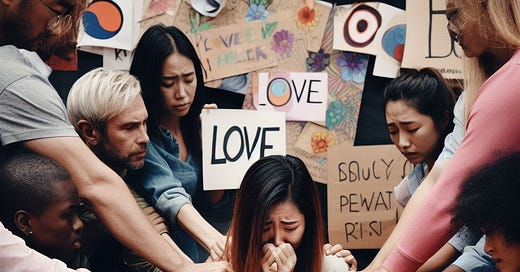The Social Psychology of Abuse and Community
Why do Communities often side with leaders when reports of abuse come to light?
Nearly every time abuse disclosures are made, we see faith communities side with the powerful. As a survivor of adult clergy sex abuse who has experienced this in spades, I have long wondered why this is. What is it about us as humans that makes it so?
While working on my master’s thesis, I dove into the literature and came up with a few answers.
Communities may sometimes side with influential abusers for several complex and interconnected reasons:
Power Dynamics Influential abusers often hold positions of power and authority within a community. This power dynamic can influence individuals to support the abuser out of fear, loyalty, or a desire for personal gain.
Fear of Reprisal People within a community may fear retaliation or negative consequences if they speak out against an influential abuser. This fear can be based on concerns about losing their own status and opportunities or facing social ostracism.
Loyalty and Belonging Communities often form around shared beliefs, interests, or goals. Individuals may feel a strong sense of loyalty to the community and its leaders, making it difficult for them to accept that someone influential within their group could be an abuser. Admitting such wrongdoing might challenge their sense of belonging and identity.
Confirmation Bias People may have preexisting biases or perceptions about the influential figure that make it challenging for them to believe or accept allegations of abuse. This can lead to a tendency to dismiss or rationalize evidence against the abuser.
Social Pressure and Norms There might be social norms within the community that discourage questioning authority or challenging the status quo. This pressure to conform can discourage individuals from speaking out against an influential figure, even when they are aware of abusive behavior.
Limited Information In some cases, community members may not have access to accurate or comprehensive information about the abuse. Lack of information or misinformation can contribute to misunderstandings and misguided support.
Cognitive Dissonance Individuals may experience cognitive dissonance when faced with evidence contradicting their beliefs or loyalties. Some people may deny or downplay the allegations to resolve this discomfort rather than confront the inconsistency.
Public Image Concerns Communities may be concerned about their public image, especially if the influential figure contributes significantly to the community's success or reputation. This concern can lead to efforts to protect the community's image at the expense of addressing abusive behavior.
It's essential to note that not all communities side with influential abusers, and many communities actively work to address and prevent abuse. However, the above factors can contribute to the challenges in addressing abuse within specific groups. Creating a culture of transparency, accountability, and support for survivors can help mitigate these challenges.
We are asking faith communities to center and support survivors.
1 Bing Image Generator




